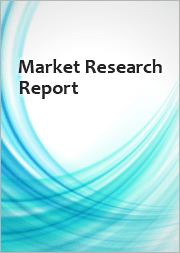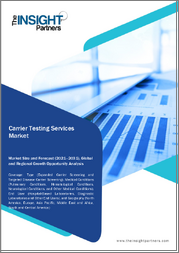
|
시장보고서
상품코드
1766125
방사성 연대측정기 시장 예측(-2032년) : 유형별, 방법별, 용도별, 최종사용자별, 지역별 분석Radiometric Dating Machine Market Forecasts to 2032 - Global Analysis By Type, Method (Radiocarbon Dating, Potassium-Argon Datin, Uranium-Lead System, Carbon-14 Dating, Fission Track Dating and Other Methods), Application, End User and By Geography |
||||||
Stratistics MRC에 따르면 세계의 방사성 연대측정기 시장은 2025년에 14억 8,000만 달러를 차지하고, 예측 기간 동안 CAGR 10.4%로 성장하여 2032년에는 29억 5,000만 달러에 달할 것으로 예상됩니다.
방사성 연대측정기는 지질학적 또는 고고학적 시료의 방사성동위원소 붕괴를 측정하여 그 연대를 결정하는 데 사용되는 분석 기기입니다. 특정 동위원소 및 그 붕괴 생성물을 검출 및 정량화하여 작동하며, 알려진 반감기를 기반으로 정확한 연대 추정을 가능하게 합니다. 일반적으로 암석, 광물, 화석에 적용되는 이 기술은 지질학, 고생물학, 고고학 연구를 지원합니다. 이 방법은 안정적인 붕괴율과 고도의 질량 분석 및 검출 시스템을 활용하여 정확한 연대측정이 가능합니다.
Nature Geoscience 저널에 게재된 연구에 따르면, 방사성 연대측정기의 발전으로 오차가 감소하고 지질 연표의 해상도가 향상되었다고 합니다.
환경, 고고학, 기후 연구 분야의 수요 증가
방사성 연대측정기는 지구과학, 고고학, 기후 복원 등의 분야에서 매우 중요한 역할을 하기 때문에 수요가 증가하고 있습니다. 이 장비는 연구자들이 물질의 연대를 정확하게 측정할 수 있게 해주며, 유적지 검증 및 환경 기준선 분석에 도움이 됩니다. 기후변화가 중요한 관심사로 떠오르면서, 연구기관들은 퇴적물과 빙하 코어의 연대측정에 이러한 기술을 투자하고 있습니다. 이러한 과학적인 모멘텀은 전 세계적으로 방사성 연대측정 기술의 사용 확대를 뒷받침하고 있습니다.
숙련된 작업자 부족
많은 연구기관들이 동위원소 분석 및 질량분석 전문지식을 갖춘 인력을 확보하는 데 어려움을 겪고 있습니다. 이러한 인력 부족은 특히 공식적인 교육 프로그램이 없는 신흥 지역에서 첨단 시스템의 활용을 제한하고 있습니다. 또한, 데이터 해석 및 캘리브레이션에 따른 가파른 학습 곡선은 좁은 전문가 집단에 대한 운영 의존도를 높여 시장 성장에 걸림돌이 되고 있습니다.
열탈착 혁신 및 고급 분석 도구
차세대 장비는 더 높은 감도, 더 빠른 처리량, 더 간소화된 보정 절차를 통해 더 광범위한 연구 응용 분야를 지원합니다. 제조업체들은 또한 AI 기반 소프트웨어를 통합하여 데이터 시각화 및 나이 모델링을 간소화하기 위해 AI 기반 소프트웨어를 통합하고 있습니다. 이러한 도구를 통해 연구 기관은 복잡한 샘플 매트릭스를 보다 안정적으로 처리할 수 있습니다. 다재다능하고 정밀한 분석 플랫폼에 대한 수요가 증가함에 따라 기술 혁신은 시장의 경쟁력과 적응력을 높이고 있습니다.
규제 및 컴플라이언스 압력
실험실은 시료 보관, 방사선 노출, 폐기물 처리와 관련된 국내외 프로토콜을 준수해야 합니다. 잦은 감사 및 특수 라이센스의 필요성은 프로젝트 일정을 지연시키고 운영 비용을 증가시킵니다. 소규모 연구소나 학술 기관에서는 이러한 제약으로 인해 사내 방사선 측정 시스템을 유지하는 데 제약이 있을 수 있습니다. 복잡한 규정 준수에 대응하는 것은 지속적인 시장 진입을 위해 필수적입니다.
COVID-19의 영향:
COVID-19는 고고학 탐사, 환경 현장 조사, 실험실 기반 시료 처리에 큰 지장을 초래했습니다. 여행 제한과 조사 시설의 폐쇄로 인해 많은 연대측정 프로젝트가 지연되었고, 새로운 장비의 설치도 제한되었습니다. 그러나 팬데믹 이후 복구 노력으로 인해 기후 변화 및 역사적 분석에 대한 관심이 다시 집중되면서 방사성 연대측정 솔루션에 대한 수요가 다시 증가하고 있습니다. 현재 기관들은 미래의 혼란에 대비하여 보다 탄력적인 워크플로우를 채택하고 원격 모니터링 및 모듈식 시스템에 투자하고 있습니다.
예측 기간 동안 베타 카운팅 부문이 가장 큰 비중을 차지할 것으로 예상됩니다.
베타 계수기 부문은 생물학적 시료 및 지질학적 시료의 동위원소 농도 측정에 사용되기 때문에 예측 기간 동안 가장 큰 시장 점유율을 차지할 것으로 예상됩니다. 베타 카운터는 방사성 탄소 및 삼중수소 측정에 있어 신뢰성, 비용 효율성, 광범위한 적용 가능성으로 평가받고 있습니다. 이러한 시스템은 학술 연구와 규제 준수 테스트를 모두 지원합니다. 저배경 계수 장치의 개발은 특히 고정밀 응용 분야에서 검출 감도를 향상시켰습니다.
예측 기간 동안 탄소 14(방사성 탄소) 연대측정 부문이 가장 높은 CAGR을 보일 것으로 예상됩니다.
예측 기간 동안 탄소14(방사성탄소) 연대측정 분야는 고고학, 지질학, 법의학 조사에서 광범위한 유용성으로 인해 가장 높은 성장률을 보일 것으로 예상됩니다. 방사성탄소 연대측정은 역사적 유물의 검증, 환경 시료의 연대측정, 토양 탄소 순환 평가 등에 활용되고 있습니다. 가속기 질량분석법 등의 기술 개선으로 정확도가 크게 향상되었고, 필요한 시료량도 감소했습니다. 이에 따라 학제간 연구에서 이 기법의 적용 범위가 넓어지고 있습니다.
최대 점유율 지역:
예측 기간 동안 아시아태평양은 지구과학 연구 및 문화 보호에 대한 투자가 증가함에 따라 가장 큰 시장 점유율을 차지할 것으로 예상됩니다. 중국, 일본, 인도와 같은 국가들은 광범위한 발굴 및 광물 탐사 활동을 지원하기 위해 분석 인프라를 확장하고 있습니다. 정부 지원 고고학 임무 및 학술 기관과의 협력은 첨단 연대측정 기술의 사용을 장려하고 있습니다.
CAGR이 가장 높은 지역:
예측 기간 동안 북미가 가장 높은 CAGR을 보일 것으로 예상되며, 이는 강력한 학술 자금, 기술 혁신 및 기관 파트너십에 기인합니다. 연구 기관과 대학은 고환경 복원 및 환경 모니터링 프로젝트를 지원하기 위해 첨단 방사성동위원소 플랫폼에 투자하고 있습니다. 주요 장비 제조업체의 존재와 탄탄한 규제 프레임워크가 첨단 분석 도구의 신속한 상용화를 뒷받침하고 있습니다.
무료 커스터마이징 서비스:
본 보고서를 구독하는 고객은 다음과 같은 무료 맞춤화 옵션 중 하나를 이용할 수 있습니다:
- 기업 소개
- 추가 시장 기업의 종합적인 프로필(최대 3개사)
- 주요 기업 SWOT 분석(3개사까지)
- 지역 세분화
- 고객의 관심에 따른 주요 국가별 시장 추정, 예측, CAGR(주: 타당성 검토에 따른)
- 경쟁사 벤치마킹
- 제품 포트폴리오, 지리적 입지, 전략적 제휴를 기반으로 한 주요 기업 벤치마킹
목차
제1장 주요 요약
제2장 서문
- 개요
- 이해관계자
- 조사 범위
- 조사 방법
- 데이터 마이닝
- 데이터 분석
- 데이터 검증
- 조사 접근법
- 조사 자료
- 1차 조사 자료
- 2차 조사 정보 출처
- 가정
제3장 시장 동향 분석
- 성장 촉진요인
- 성장 억제요인
- 기회
- 위협
- 용도 분석
- 최종사용자 분석
- 신흥 시장
- COVID-19의 영향
제4장 Porter's Five Forces 분석
- 공급 기업의 교섭력
- 구매자의 교섭력
- 대체품의 위협
- 신규 참여업체의 위협
- 경쟁 기업 간의 경쟁 관계
제5장 세계의 방사성 연대측정기 시장 : 유형별
- 알파 카운팅
- 베타 카운팅
- 감마 카운팅
- 질량 분석
- 기타 유형
제6장 세계의 방사성 연대측정기 시장 : 방법별
- 방사성 탄소 연대측정
- 칼륨-아르곤 연대측정
- 우라늄 납계 연대측정
- 탄소 14(방사성 탄소) 연대측정
- 핵분열 트랙 연대측정
- 기타 방법
제7장 세계의 방사성 연대측정기 시장 : 용도별
- 지질학 연구
- 고고학 연구
- 고생물학
- 환경 과학
- 원자력 연구·안전
- 석유 및 가스 탐사
제8장 세계의 방사성 연대측정기 시장 : 최종사용자별
- 학술·연구기관
- 정부·지질 조사 기관
- 광업·탐사 회사
- 박물관·역사 보존 기관
- 원자력발전소·연구소
- 기타 최종사용자
제9장 세계의 방사성 연대측정기 시장 : 지역별
- 북미
- 미국
- 캐나다
- 멕시코
- 유럽
- 독일
- 영국
- 이탈리아
- 프랑스
- 스페인
- 기타 유럽
- 아시아태평양
- 일본
- 중국
- 인도
- 호주
- 뉴질랜드
- 한국
- 기타 아시아태평양
- 남미
- 아르헨티나
- 브라질
- 칠레
- 기타 남미
- 중동 및 아프리카
- 사우디아라비아
- 아랍에미리트
- 카타르
- 남아프리카공화국
- 기타 중동 및 아프리카
제10장 주요 발전
- 계약, 파트너십, 협업, 합작투자
- 인수와 합병
- 신제품 발매
- 사업 확대
- 기타 주요 전략
제11장 기업 개요
- Waters Corporation
- Thermo Fisher Scientific
- Teledyne Leeman Labs
- Skyray Instrument
- Shimadzu Corporation
- Sercon Ltd.
- Picarro Inc.
- PerkinElmer
- LECO Corporation
- Labindia Instruments
- IsotopX
- HORIBA Scientific
- Hitachi High-Tech Corporation
- EuroVector
- Elementar Analysensysteme GmbH
- Bruker Corporation
- Beijing Beifen-Ruili Analytical Instrument
- Agilent Technologies
According to Stratistics MRC, the Global Radiometric Dating Machine Market is accounted for $1.48 billion in 2025 and is expected to reach $2.95 billion by 2032 growing at a CAGR of 10.4% during the forecast period. Radiometric dating machine is an analytical instrument used to determine the age of geological or archaeological samples by measuring the decay of radioactive isotopes within them. It operates by detecting and quantifying specific isotopes and their decay products, enabling accurate age estimations based on known half-lives. Commonly applied to rocks, minerals, and fossils, this technology supports studies in geology, paleontology, and archaeology. The method ensures precise dating by leveraging stable decay rates and advanced mass spectrometry or detection systems.
According to research published in Nature Geoscience, advancements in radiometric dating instrumentation have reduced errors and improved the resolution of geological timelines.
Market Dynamics:
Driver:
Increasing demand in environmental, archaeological & climate research
Radiometric dating machines are seeing increased demand due to their pivotal role in disciplines such as earth sciences, archaeology, and climate reconstruction. These instruments enable researchers to determine the age of materials with precision, aiding in historical site verification and environmental baseline analysis. As climate variability becomes a critical focus, institutions are investing in these technologies for sediment and ice core dating. This scientific momentum supports expanded use of radiometric technologies worldwide.
Restraint:
Shortage of skilled operators
Many institutions struggle to recruit personnel with specialized knowledge in isotope analysis or mass spectrometry. This talent gap restricts the utilization of sophisticated systems, particularly in emerging regions lacking formal training programs. Additionally, the steep learning curve involved in data interpretation and calibration increases operational dependency on a narrow pool of experts hampering the market growth.
Opportunity:
Innovations in thermal desorption & advanced analyst tools
Next-generation machines offer improved sensitivity, faster throughput, and simplified calibration procedures, catering to a broader range of research applications. Manufacturers are also integrating AI-powered software to streamline data visualization and age modeling. These tools enable institutions to handle complex sample matrices with greater reliability. As demand grows for versatile and precise analytical platforms, innovation is driving a more competitive and adaptive market.
Threat:
Regulatory & compliance pressures
Laboratories must comply with national and international protocols related to sample storage, radiation exposure, and waste disposal. Frequent audits and the need for specialized licenses can delay project timelines and inflate operational costs. For smaller labs or academic units, these constraints may limit the feasibility of maintaining in-house radiometric systems. Navigating compliance complexities is critical for sustained market access.
Covid-19 Impact:
The pandemic significantly hindered archaeological expeditions, environmental fieldwork, and laboratory-based sample processing. Travel restrictions and research facility closures delayed numerous dating projects and curtailed new instrument installations. However, post-pandemic recovery efforts have renewed focus on climate change and historical analysis, revitalizing demand for radiometric dating solutions. Institutions are now adopting more resilient workflows and investing in remote monitoring and modular systems to prepare for future disruptions.
The beta counting segment is expected to be the largest during the forecast period
The beta counting segment is expected to account for the largest market share during the forecast period due to its established use in determining isotope concentrations across biological and geological samples. Beta counters are valued for their reliability, cost-effectiveness, and broad applicability in radiocarbon and tritium measurements. These systems support both academic research and regulatory compliance testing. The development of low-background counting instruments has enhanced detection sensitivity, particularly in high-precision applications.
The carbon-14 (radiocarbon) Dating segment is expected to have the highest CAGR during the forecast period
Over the forecast period, the carbon-14 (radiocarbon) segment is predicted to witness the highest growth rate owing to its extensive utility in archaeological, geological, and forensic investigations. Radiocarbon dating is increasingly used to validate historical artifacts, date environmental samples, and assess soil carbon cycles. Technological refinement such as accelerator mass spectrometry has significantly improved precision and reduced required sample sizes. This has broadened the method's applicability in interdisciplinary studies.
Region with largest share:
During the forecast period, the Asia Pacific region is expected to hold the largest market share attributed to its rising investment in geoscience research and cultural preservation. Countries like China, Japan, and India are expanding their analytical infrastructure to support extensive excavation and mineral exploration activities. Government-backed archaeological missions and collaborations with academic institutions are encouraging the use of advanced dating techniques.
Region with highest CAGR:
Over the forecast period, the North America region is anticipated to exhibit the highest CAGR owing to strong academic funding, technological innovation, and institutional partnerships. Research organizations and universities are investing in sophisticated radiometric platforms to support paleoclimate reconstruction and environmental monitoring projects. The presence of leading equipment manufacturers and robust regulatory frameworks is supporting rapid commercialization of advanced analytical tools.
Key players in the market
Some of the key players in Radiometric Dating Machine Market include Waters Corporation, Thermo Fisher Scientific, Teledyne Leeman Labs, Skyray Instrument, Shimadzu Corporation, Sercon Ltd., Picarro Inc., PerkinElmer, LECO Corporation, Labindia Instruments, IsotopX, HORIBA Scientific, Hitachi High-Tech Corporation, EuroVector, Elementar Analysensysteme GmbH, Bruker Corporation, Beijing Beifen-Ruili Analytical Instrument, and Agilent Technologies.
Key Developments:
In May 2025, Agilent Technologies launched the InfinityLab Pro iQ Series of intelligent LC-mass detection systems (Pro iQ and Pro iQ Plus), offering next-gen sensitivity and intelligent features for advanced biomolecule analysis.
In April 2025, Thermo Fisher opened its first U.S. Advanced Therapies Collaboration Center in Carlsbad, California a 6,000 sq ft facility designed to help biotech and biopharma partners accelerate cell- and gene-therapy process development and commercialization.
In February 2025, Thermo Fisher announced the acquisition of Solventum's purification and filtration business for $4.1 billion, adding a ~$1 billion-revenue unit to expand its biologic medication development and bioprocessing capabilities.
Types Covered:
- Alpha Counting
- Beta Counting
- Gamma Counting
- Mass Spectrometry
- Other Types
Methods Covered:
- Radiocarbon Dating
- Potassium-Argon Datin
- Uranium-Lead System
- Carbon-14 (Radiocarbon) Dating
- Fission Track Dating
- Other Methods
Applications Covered:
- Geological Research
- Archaeological Studies
- Paleontology
- Environmental Science
- Nuclear Research & Safety
- Oil & Gas Exploration
End Users Covered:
- Academic & Research Institutions
- Government & Geological Surveys
- Mining & Exploration Companies
- Museums & Historical Preservation Agencies
- Nuclear Power Plants & Labs
- Other End Users
Regions Covered:
- North America
- US
- Canada
- Mexico
- Europe
- Germany
- UK
- Italy
- France
- Spain
- Rest of Europe
- Asia Pacific
- Japan
- China
- India
- Australia
- New Zealand
- South Korea
- Rest of Asia Pacific
- South America
- Argentina
- Brazil
- Chile
- Rest of South America
- Middle East & Africa
- Saudi Arabia
- UAE
- Qatar
- South Africa
- Rest of Middle East & Africa
What our report offers:
- Market share assessments for the regional and country-level segments
- Strategic recommendations for the new entrants
- Covers Market data for the years 2024, 2025, 2026, 2028, and 2032
- Market Trends (Drivers, Constraints, Opportunities, Threats, Challenges, Investment Opportunities, and recommendations)
- Strategic recommendations in key business segments based on the market estimations
- Competitive landscaping mapping the key common trends
- Company profiling with detailed strategies, financials, and recent developments
- Supply chain trends mapping the latest technological advancements
Free Customization Offerings:
All the customers of this report will be entitled to receive one of the following free customization options:
- Company Profiling
- Comprehensive profiling of additional market players (up to 3)
- SWOT Analysis of key players (up to 3)
- Regional Segmentation
- Market estimations, Forecasts and CAGR of any prominent country as per the client's interest (Note: Depends on feasibility check)
- Competitive Benchmarking
- Benchmarking of key players based on product portfolio, geographical presence, and strategic alliances
Table of Contents
1 Executive Summary
2 Preface
- 2.1 Abstract
- 2.2 Stake Holders
- 2.3 Research Scope
- 2.4 Research Methodology
- 2.4.1 Data Mining
- 2.4.2 Data Analysis
- 2.4.3 Data Validation
- 2.4.4 Research Approach
- 2.5 Research Sources
- 2.5.1 Primary Research Sources
- 2.5.2 Secondary Research Sources
- 2.5.3 Assumptions
3 Market Trend Analysis
- 3.1 Introduction
- 3.2 Drivers
- 3.3 Restraints
- 3.4 Opportunities
- 3.5 Threats
- 3.6 Application Analysis
- 3.7 End User Analysis
- 3.8 Emerging Markets
- 3.9 Impact of Covid-19
4 Porters Five Force Analysis
- 4.1 Bargaining power of suppliers
- 4.2 Bargaining power of buyers
- 4.3 Threat of substitutes
- 4.4 Threat of new entrants
- 4.5 Competitive rivalry
5 Global Radiometric Dating Machine Market, By Type
- 5.1 Introduction
- 5.2 Alpha Counting
- 5.3 Beta Counting
- 5.4 Gamma Counting
- 5.5 Mass Spectrometry
- 5.6 Other Types
6 Global Radiometric Dating Machine Market, By Method
- 6.1 Introduction
- 6.2 Radiocarbon Dating
- 6.3 Potassium-Argon Datin
- 6.4 Uranium-Lead System
- 6.5 Carbon-14 (Radiocarbon) Dating
- 6.6 Fission Track Dating
- 6.7 Other Methods
7 Global Radiometric Dating Machine Market, By Application
- 7.1 Introduction
- 7.2 Geological Research
- 7.3 Archaeological Studies
- 7.4 Paleontology
- 7.5 Environmental Science
- 7.6 Nuclear Research & Safety
- 7.7 Oil & Gas Exploration
8 Global Radiometric Dating Machine Market, By End User
- 8.1 Introduction
- 8.2 Academic & Research Institutions
- 8.3 Government & Geological Surveys
- 8.4 Mining & Exploration Companies
- 8.5 Museums & Historical Preservation Agencies
- 8.6 Nuclear Power Plants & Labs
- 8.7 Other End Users
9 Global Radiometric Dating Machine Market, By Geography
- 9.1 Introduction
- 9.2 North America
- 9.2.1 US
- 9.2.2 Canada
- 9.2.3 Mexico
- 9.3 Europe
- 9.3.1 Germany
- 9.3.2 UK
- 9.3.3 Italy
- 9.3.4 France
- 9.3.5 Spain
- 9.3.6 Rest of Europe
- 9.4 Asia Pacific
- 9.4.1 Japan
- 9.4.2 China
- 9.4.3 India
- 9.4.4 Australia
- 9.4.5 New Zealand
- 9.4.6 South Korea
- 9.4.7 Rest of Asia Pacific
- 9.5 South America
- 9.5.1 Argentina
- 9.5.2 Brazil
- 9.5.3 Chile
- 9.5.4 Rest of South America
- 9.6 Middle East & Africa
- 9.6.1 Saudi Arabia
- 9.6.2 UAE
- 9.6.3 Qatar
- 9.6.4 South Africa
- 9.6.5 Rest of Middle East & Africa
10 Key Developments
- 10.1 Agreements, Partnerships, Collaborations and Joint Ventures
- 10.2 Acquisitions & Mergers
- 10.3 New Product Launch
- 10.4 Expansions
- 10.5 Other Key Strategies
11 Company Profiling
- 11.1 Waters Corporation
- 11.2 Thermo Fisher Scientific
- 11.3 Teledyne Leeman Labs
- 11.4 Skyray Instrument
- 11.5 Shimadzu Corporation
- 11.6 Sercon Ltd.
- 11.7 Picarro Inc.
- 11.8 PerkinElmer
- 11.9 LECO Corporation
- 11.10 Labindia Instruments
- 11.11 IsotopX
- 11.12 HORIBA Scientific
- 11.13 Hitachi High-Tech Corporation
- 11.14 EuroVector
- 11.15 Elementar Analysensysteme GmbH
- 11.16 Bruker Corporation
- 11.17 Beijing Beifen-Ruili Analytical Instrument
- 11.18 Agilent Technologies

















